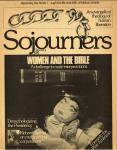That God is on the side of the poor and that the scriptures are uncompromising in their demand for economic and social justice is much more clear biblically than most of the issues that have divided churches. The scriptures claim that to know God is to do justice and to plead the cause of the oppressed. Yet this central biblical imperative is one of the first to be purged from a church that has be come accommodated and conformed to the established order.
The biblical narratives speak clearly about the structural realities of oppression and the systematized relegating of “the other” to a subhuman status. Using “the other,” the despised race or class or sex, is a unique sort of sin and is an issue at the heart of the gospel. The vantage point for biblical people is to view systems, societies, cultures, and institutions from the point of view of their victims. This gives the Christian community a unique role in history--a perpetually revolutionary role in history.
In Jesus Christ, God takes the form of “the other” as a member of an oppressed race, an exploited class, and a colonized nation. God, in Jesus Christ, becomes poor and oppressed. The paradox and scandal of the incarnation is that God takes the form of a servant and makes himself one with “the others,” The church visioned in the New Testament also makes itself one with the poor and the oppressed and as sum us the mantle of servant hood after the manner of God in Jesus Christ.
Any serious spiritual quest on the part of biblical people will ultimately bring a confrontation with the question of suffering and sacrifice. The vital relationships between suffering and liberation, between sacrifice and change, between crucifixion and resurrection become evident as the church decides to live out of a theology that is truly incarnational.
The failure of the institutional churches to come to terms with the meaning of suffering is at the heart of why the church’s programs of social action have had such disappointing and disillusioning results in recent years. Clearly, we cannot talk about the roots of the gospel without speaking of the reality and the power of suffering. Also clear from both the bible and from history is that we cannot talk about fundamental social change without speaking of suffering.
The American student movements of the Sixties failed precisely at this point--an unwillingness to pay the price of radical social change. Speaking out of my own experience of involvement in those movements, it was when the cost of fundamental change became increasingly clear, in personal terms, that most student activists caved in and the system prevailed. The internal collapse of the student movement was much more a cause of the demise than was any external aggression. That disintegration, in my opinion, was due to lacking the adequate basis or spiritual resources for prolonged social struggle security, and personal success proved more attractive than suffering and sacrifice. Since those days, some of us have come to Christian commitment and found a deeper meaning and basis for liberation in the gospel.
It was at the point of the collapse of the secular student movement, that the churches could have provided clear social leadership in justice and liberation by demonstrating a willingness to accept the cost of change and endure in that struggle with the spiritual resources of the gospel. Unfortunately, the church’s social concerns began then also to diminish, which simply reflected the secular pattern. This failure of nerve or loss of faith seemed to come when the established churches realized that to persist and go still further in a liberation struggle would increasingly threaten the church’s own institutional and financial base. The price of change might have well been the existence of the established church structures themselves. This was a price the churches were not willing to pay. Added to the institutional inhibitions was the tendency of many religious activists to participate in the movements of the sixties without a clear Christian self-understanding and biblical identity. Being unable to clearly articulate their own reasons for involvement, their activity often ended when the secular motivations and resources of other activists collapsed.
Communities of faith can endure suffering. Organizational bureaucracies usually cannot. This is a question that be faced by denominational structures and ecumenical organizations. Historically, the heart of Christian resistance to tyranny and oppression has been the worship, prayer, and bible study of faithful communities. That is the context in which the gift of discernment comes. That is the context where the church can have a meaningful identity with the poor and oppressed. The church’s responsibility to the poor comes in making community with the poor more than acting as ecclesiastical organizations that lobby on behalf of the poor. The first community the church must have with the poor is a community of suffering.
Because the early Christians would not worship the imperial cult of the Roman empire, they were often accused of atheism. In other words, the early church was atheist in regard to the gods of the empire. The question must be asked, are we, as Christians in America, atheist in regard to the gods of the American system, or do we peacefully pay the homage and worship that those false gods demand? To be a Christian is to be an atheist to all the gods of this world and to their manifestations in every historical system and ideological consensus. To be an atheist to the gods of the American system and to give our selves over to those whom that system treats as enemies and outsiders, may bring persecution, suffering and the danger of death itself. That seems to me an important meditation to keep in mind as the nation pays devotion to its gods in this bicentennial year.
Jim Wallis is editor-in-chief of Sojourners.

Got something to say about what you're reading? We value your feedback!
